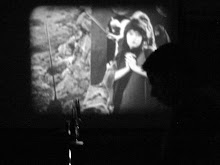On the Man Booker Prize shortlist this year I anticipated this to be the type of book I'd wind up recommending left and right. Having read it I am somewhat surprised it is on the shortlist.
My wife read this just before I did, she said,"It's not a g-g-r-r-r-eat book but it's good." She read 'Sea of Poppies' recently and her expectations were quite different. As for me, I was hoping to move to a new location for my next novel. West Indies seemed to me to be a place I knew little about through Naipaul's Mr. Biswas but this time the setting was a different with slavery as the backdrop. Needless to say I was excited about this book. More so with the quality of the other novels I'd read from the Booker lists this year.
'The Long Song' starts well, it throws its reader a challenge, asks the reader to read on, glean a different slavery story. Not having read too many stories on slavery I think I can still agree with this different bit. Most stories with backdrops of hardships tend to focus on the hardships, trying to manipulate us to brink of tears or indignation at the oppressors, forgetting that sufferers have lives to live. Even slaves and servants have a sense of routine and social structure in which they must progress. There are too many things, in slaves' lives too, that need their ruminations whereby not sitting to curse fate or destiny. It is this aspect of life that is interests me. Exemplars that I recall instantly are 'The Counterfeiters' and 'Slumdog Millionaire'. In the former, the protagonist must sell his skills to the Germans to save his life at the same time working his way through table-tennis in a concentration camp. Simon Beaufoy infuses love, greed and ingenuity into Jamaal for him to work through rioting mobs, child-blinding mafia and cricket-betting gangsters with crafty guile. Such seem to be thoughts of Andrea Levy as she makes July sexy and crafty and her missus fatty batty, dewy eyed but still as crafty as our July. It is this rivalry between mistress and servant that keeps the novel alive for me. Missus Mortimer almost makes July an Angrezi Mem, permits July to bear her husband's son only because she knows she will outwit her in the end. July, using her guile, makes herself indispensible to the Missus, later makes herself indispensible to the Massa (only to delude herself) with the love of a parish overseer. The book is all about matching wits, if it isn't July verus Missus, then it's July verus Miss Clara, if not these two then it's July versus her son. It's these portions I enjoyed the most.
The historical bit actually isn't much. It's not overused and I liked it for this, this also makes it a not-too-long novel. But the bit of history it did supply was something I'd not known. I wasn't aware of the structure within the slave community in a particular plantation, some slaves on the field and some at home, slaves working on the plantation field and also having some portion of land to grow their own plants for sale or fish in a lake, etc. Also wasn't exactly aware of how freedom could be bought, the significance of a mulatto or quadroon, etc.
The characterization is not over-exploited, which is good, but also under-developed, whic is not good. Caroline Mortimer doesn't have a showdown as such against July. Miss Clara clearly seems to have won the battle, although July tries to fictionalize a victory at one point. It's the supporting cast of characters that are underdeveloped. A lot of names of slaves are thrown around towrds the end and I couldn't recollect most.
The last few pages which trace the life of July's son Nimrod served some purpose? I wasn't interested in reading at this point. Just wanted to drop the book at this point. Why tell that story? I didn't care for Thomas at any point in the novel.
My final opinion mirrors my wife's.

No comments:
Post a Comment